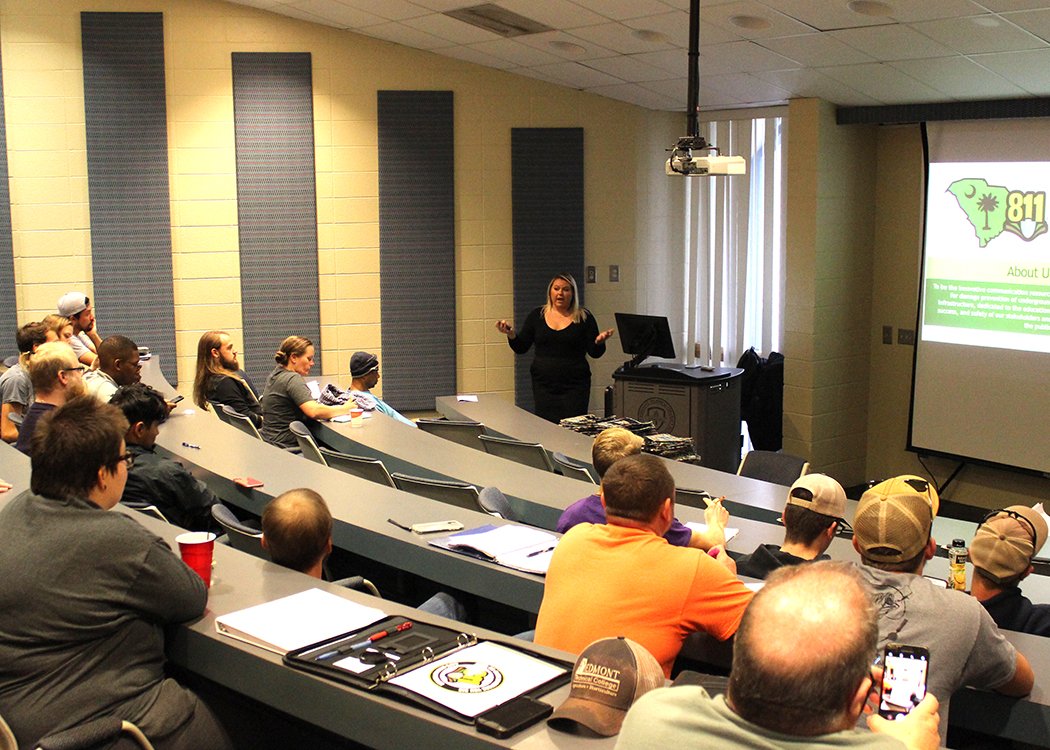Horticulture, Construction Technology Students Learn About Risks of Digging and SC811 Resource
Piedmont Technical College (PTC) horticulture and building construction students last month learned the real dirt on accidental utility line ruptures and how to prevent them. It’s a growing concern. A recent investigation by Piedmont Natural Gas in North Carolina found a 40% increase in leaks caused by a contractor or other third party. Construction is up in the region, and PTC Horticulture Program Director Daniel Greenwell saw the need to help inform students who share the common risk of digging or excavation in their work about South Carolina 811.
“811 is a national number that you can call to locate unseen utility lines in their area before they dig,” Greenwell explained. “It’s an essential safety measure. Calling 811 protects against both bodily harm and liability.”
Greenwell arranged for Lexie Ozerov of South Carolina 811 to conduct a training seminar in Greenwood. Her presentation covered the process of submitting a “locate” request at least three working days before digging. She told the group that SC811 is a free service contractors can contact to report their intent to excavate. SC811 then notifies facility operators to locate any underground utility lines in the proposed excavation area.
 “Landscapers plant trees. The risk is there, especially for hardscaping projects where you are installing a retaining wall or irrigation lines,” Greenwell said. “My horticulture students will be doing that type of work. I invited the building construction technology students to join us for the seminar because they lay foundations and piping in their work. It’s relevant for both professions.”
“Landscapers plant trees. The risk is there, especially for hardscaping projects where you are installing a retaining wall or irrigation lines,” Greenwell said. “My horticulture students will be doing that type of work. I invited the building construction technology students to join us for the seminar because they lay foundations and piping in their work. It’s relevant for both professions.”
No one wants to cause one of those violent gas line explosions that are reported on the national news. Greenwell feels it is vitally important that his students understand the need to utilize SC811.
“They’ve made it easy. There are three ways you can notify SC811 of your intent to excavate,” he said. “They have an online portal (sc811.com/portal), a downloadable mobile app, and you can also call it in by phone.”
Once a locate notice is submitted, members/utilities respond using the SC811 360 Positive Response System. The system uses a color-coded system to indicate whether a conflict exists and whether it is marked. Once the excavator and the utility have reached agreement to proceed with marking the site if underground lines are located there, the excavator gets the “green light” to begin work. It is mandatory, however, for the excavator to notify SC811 when they have completed their work so the notice can be closed.
Failure to utilize SC811 comes with a number of unwanted consequences: being sued by the facility owner to recover losses from any damage caused; causing potentially life-threatening outages for essential services; sustaining penalties or fines; causing loss of property or equipment; and sustaining injuries or even loss of life. Barring that worst-case scenario, excavators could face very steep costs.
Ozerov noted that 99% of digging accidents can be prevented by calling 811 beforehand. SC811 received 929,000 locate requests last year.
PTC faculty invite outside speakers when a topic being addressed provides information that helps better prepare students for the workplace. For more information about PTC’s Horticulture Technology Program, visit www.ptc.edu/horticulture. For more information about PTC’s Building Construction Technology Program, visit www.ptc.edu/bct.
PHOTO: Lexie Overov addresses PTC horticulture and building construction technology students.